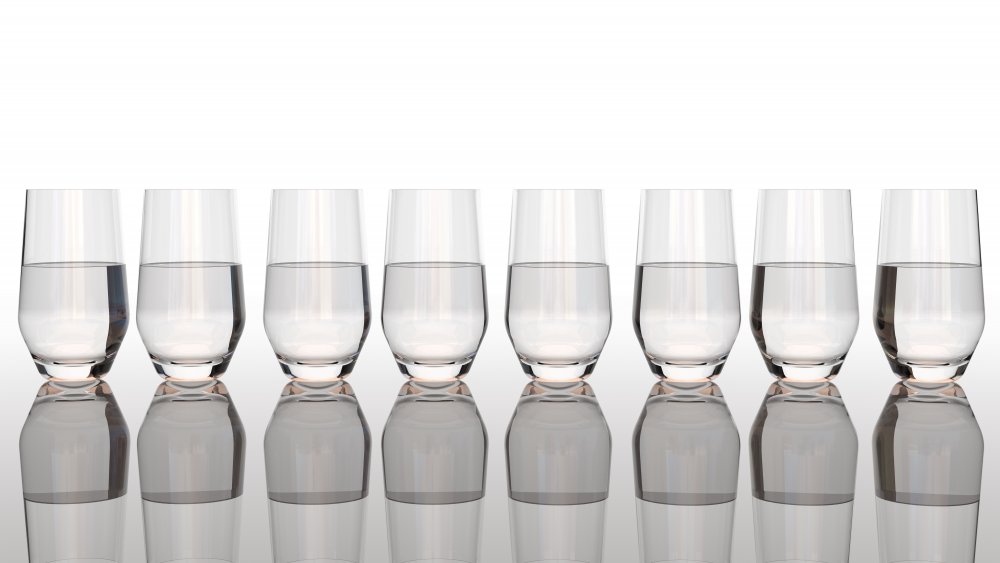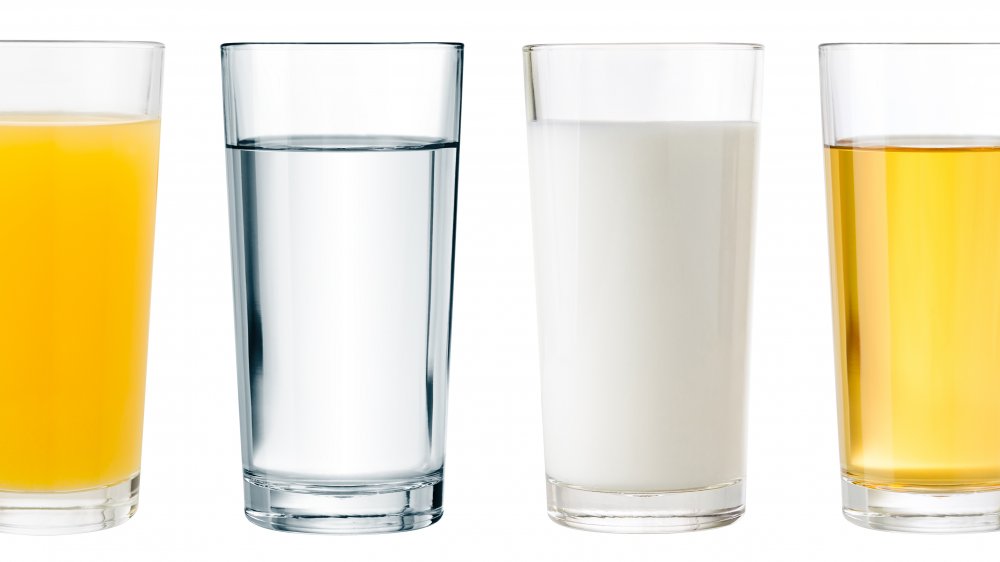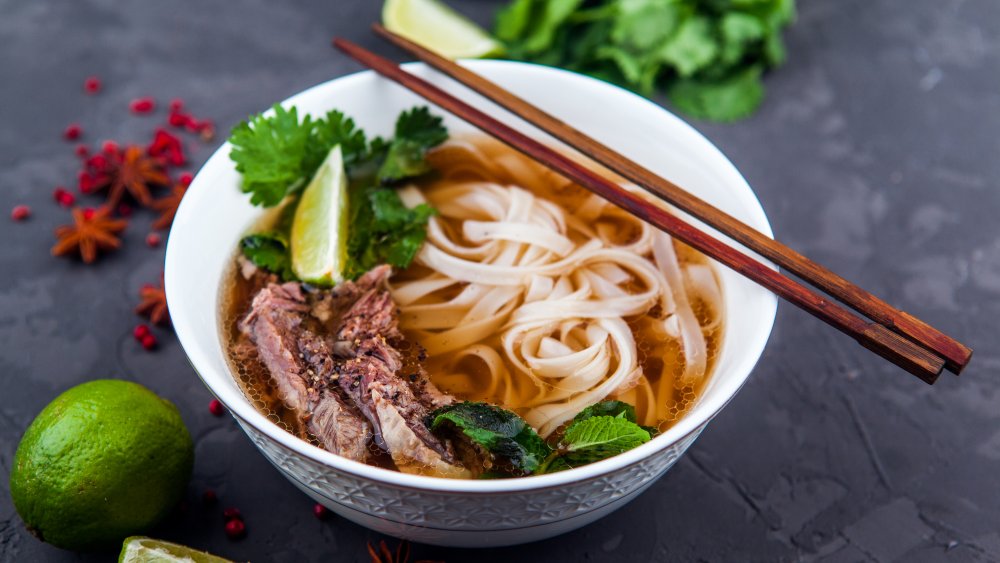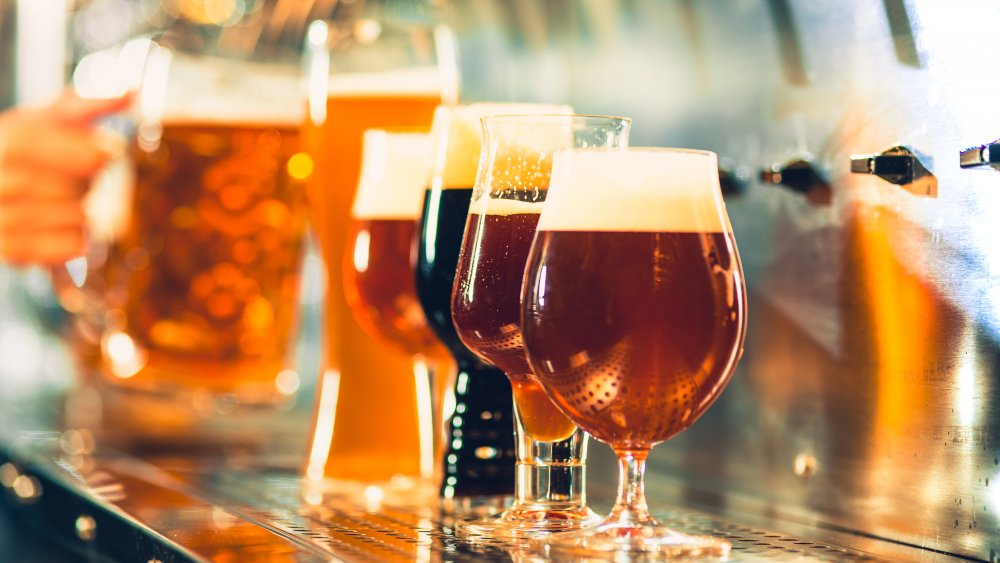Fact Or Fiction: Everyone Needs To Drink 8 Glasses Of Water Per Day
It's one of those things everybody knows, but only some people are actually able to do: drink eight glasses (or two quarts) of water every single day in order to provide your body with the optimum level of hydration. But is this particular bit of conventional wisdom actually true, or is it yet another nutritional myth? Well, maybe. Or maybe not. This is one piece of advice on which medical professionals have yet to reach a consensus, it would seem.
WebMD is one source claiming that there's no need to count cups, explaining that if you just drink when you're thirsty, you should be good. They do admit, though, that you might need to push yourself to drink a bit more water if you live in a hot climate, if you lead an active lifestyle, or if your pee looks very dark (assuming you can see the color it before it gets diluted in the bowl).
You may need more than eight glasses (though not necessarily water)
The Mayo Clinic, on the other hand, says that eight glasses is a reasonable goal, since the body's actual fluid needs are about 15.5 cups per day for men and 11.5 cups per day for women. They say that about 20 percent of our daily fluid intake comes from the foods we eat, but that leaves men in need of about 12 1/2 cups and women of nine cups of liquid. While it does not necessarily need to be water that you drink per se, since yes, even coffee and soda can be hydrating, medical professionals are never going to suggest you overdo it on sugar and caffeine in order to stave off dehydration.
They also suggest boosting your fluid intake in warm weather, or before, during, and after exercise, while also noting that if you are ill you'll need extra liquids to replace those you may have lost through sweating or other even more unpleasant bodily events. Pregnant women will also require more fluid, and women who are breastfeeding need the most liquid of all — the Office on Women's Health recommends 13 cups per day in order to keep that milk flowing.
How you can hydrate without water
If you're totally not the Hydro Flask type, MedExpress suggests several alternative methods of upping your fluid intake besides lugging a water bottle everywhere you go. You could always drink milk, as this beverage may be even more hydrating than water as well as providing a number of extra nutritional benefits. If you're a smoothie fan, these provide liquids from both the yogurt and the fruits, or you can also puree and freeze fruit to make healthy popsicles. (Regular old popsicles can also be hydrating, although likely to be high in sugar, artificial coloring and flavorings, and other bad stuff.)
Begin your day the extra-hydrating way with a big bowl of oatmeal, since oats absorb a ton of liquid as they cook (or don't cook, in the case of overnight oats). For lunch, have a nice liquidy soup with a side salad, since salad veggies are often high in moisture content. At dinnertime, why not try swapping out dry pasta for zoodles or other spiralized veggies? These will give your meal an extra boost of hydration.
Drinks more likely to harm than hydrate
Just because it's liquid, though, doesn't mean it's good to drink. Licensed Dietitian Nutritionist Kimberly Arnold spoke with Delish about the worst drinks for hydration, and she says the top three to avoid (or at least to compensate for with extra water-drinking) are hot chocolate, energy drinks, and alcoholic beverages, The first two are problematic because of the high levels of sugar they contain in proportion to the liquid content, and sugary foods, according to drink mix makers Hydrant, do have a dehydrating effect on the body. (So yes, this would imply that milkshakes and Frappuccinos are also not going to be such great hydration options, either.)
Alcohol is also notoriously dehydrating due to its diuretic properties (i.e., propensity to make you pee), which is why hangovers so often involve splitting headaches as well as raging thirst. If you must indulge, though, Bon Appetit advises that beer is the least dehydrating type of booze, and most beers tend to have a lower ABV, which could help you stay out of the dehydration danger zone. However, keep in mind that any alcoholic drink is going to have a dehydrating effect, and the more you drink (even if it's low ABV beer), the worse the effect can be.
They do note that diluting hard liquor with mixers and ice to create cocktails can also help mitigate (though not negate) all of the damage done by the alcohol itself. In order to avoid drinking-related dehydration, though, a good game plan is to knock back one glass of water for every boozy drink you take.




